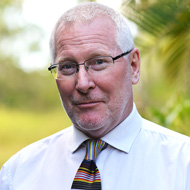
Dr Richard Squires will head up the group’s work to promote best practice vaccination.
James Cook University Professor Richard Squires has been appointed chair of the WSAVA’s Vaccination Guidelines Group (VGG).
Dr Squires will head up the VGG team, providing evidence-based scientific advice to the global veterinary profession on best practice vaccination. He succeeds Emeritus Professor Michael Day, who chaired the VGG from 2009 until March 2020.
“Thanks to Michael Day’s exceptional leadership, VGG Guidelines are transforming vaccination practice and, in so doing, supporting the welfare of millions of companion animals around the world,” commented Dr Shane Ryan, WSAVA President. “We are delighted to welcome Richard to his new role of VGG Chair and look forward to working with him and the rest of the VGG team in the months ahead.”
A graduate of the University of Bristol, Dr Squires worked in general practice before undertaking postgraduate clinical training at the Universities of Cambridge and Pennsylvania and research training at Glasgow. He holds a PhD for research in which he sought a retroviral aetiology for canine lymphoma.
He held faculty positions at the Universities of Liverpool, Pennsylvania, Wisconsin and Massey University before joining James Cook University in 2007. He is a Diplomate of both the American and European Colleges of Veterinary Internal Medicine and holds the Royal College of Veterinary Surgeons’ Diploma in Veterinary Radiology.
Dr Squires has been actively involved in the creation of the VGG's Global Guidelines and its more recent Regional Guidelines. Commenting on his appoitnment, Dr Squires said:
“I am delighted and honoured to have been asked to continue Michael Day's outstanding work as Chair of the WSAVA VGG. I look forward to working with the WSAVA leadership, with VGG members and with our partner MSD Animal Health on the next phase of our work.”
Image (C) WSAVA.



 The latest
The latest